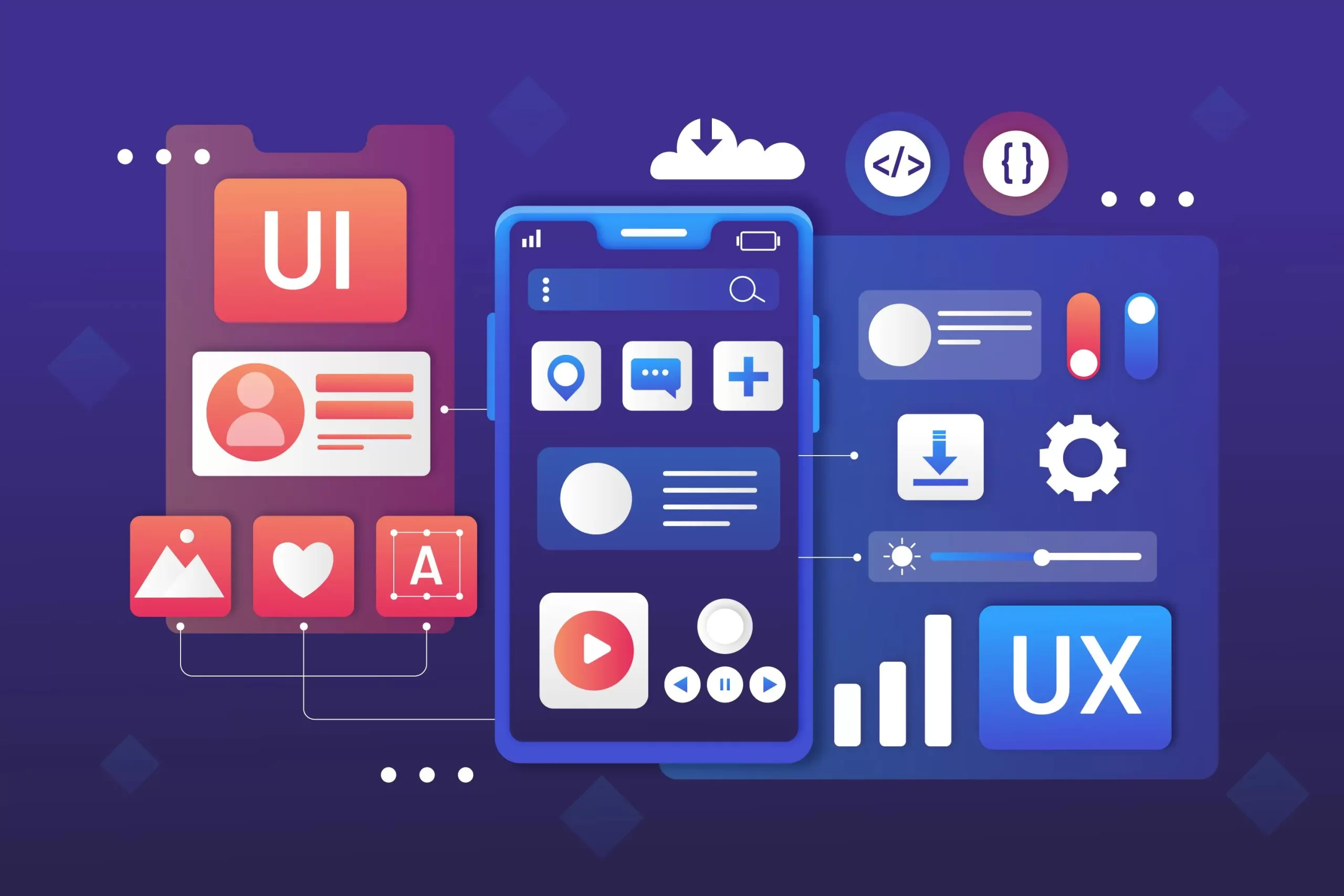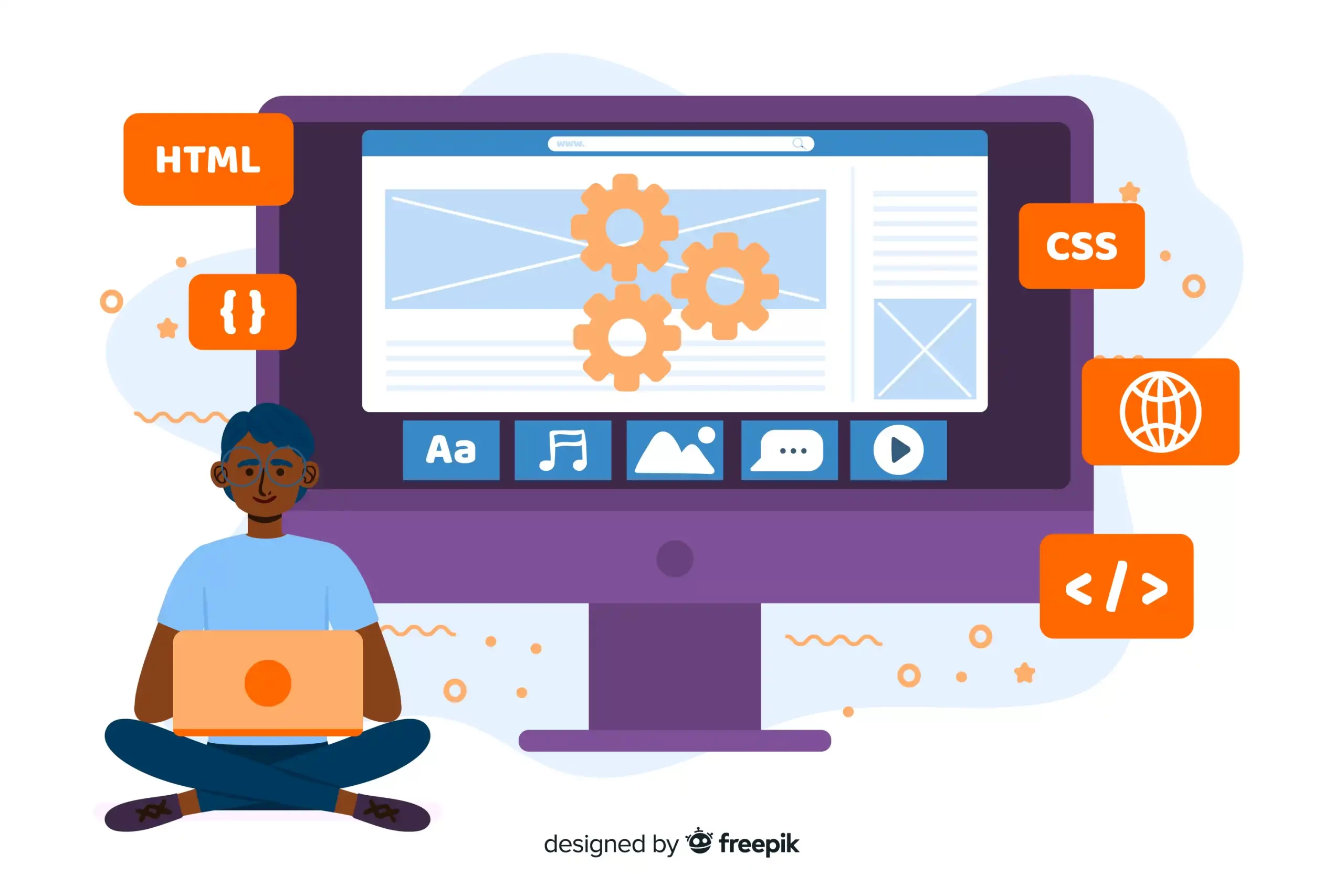The web development industry is projected to grow by 23% over the next decade. With this kind of demand, now is the perfect time to start your journey as a web developer. This guide will help you master the skills you need to land your dream job.
Whether you’re starting from scratch or pivoting from a different profession, understanding the steps and dedication required is key. It’s a path paved with innovation, problem-solving, and continuous learning. Success in web development not only demands technical proficiency but also a proactive approach in adapting to industry trends. With the right mindset and guidance, you too can join the ranks of the tech-savvy professionals who make the digital world go round.
Key Takeaways
- Web development is rewarding and dynamic: Embrace the challenges that come with mastering this continuously evolving field.
- Align goals with realities: Define what success as a web developer means to you. Are you drawn to front-end, back-end, or full-stack?
- Commit to continuous learning: Even after landing a job, stay updated on the latest web development trends and tools to remain competitive.
- Develop a proactive mindset: Adapt to industry changes and be ready to learn new technologies.
- Embrace challenges: View the complexity of web development as an opportunity for growth and innovation.
Determining Your Web Development Career Goals
Embarking on a career in web development requires you to set clear goals and understand the various paths you can take. Whether you aim to specialize in front-end, back-end, or full stack development, defining success in your terms is critical to your progression. Consider the following facets to outline your career trajectory.
Defining Success as a Web Developer
Success in web development is as diverse as the field itself. For some, it may mean creating visually stunning websites as a front-end developer, while for others, it might be about building robust server solutions as a back-end developer. Defining success for you could also encompass achieving a work-life balance, continuously learning new technologies, or solving complex problems with innovative solutions. Take the time to reflect on what success means to you and let that guide your career decisions.
Front-end vs. Back-end Development Paths
Choosing between front-end development and back-end development is a decisive step in your career. Front-end developers focus on the user interface and experience, using languages like HTML, CSS, and JavaScript. Back-end developers work on server-side software, dealing with databases, APIs, and server logic, typically using languages like Ruby, Python, or Java. Here’s a comparison to help you decide:
| Aspect | Front-end Development | Back-end Development |
| Primary Focus | User Interface/Experience | Server, Database, Application Logic |
| Key Languages | HTML, CSS, JavaScript | Ruby, Python, Java, PHP |
| Toolset | Design frameworks, Libraries like React | Server frameworks, Database management systems |
| Development Approach | Visual and interactive design | Logical, structure-focused development |
Specializing in Full Stack: The All-in-One Approach
If choosing between front-end and back-end paths seems daunting, you may consider the full stack approach. Full stack developers have the expertise to handle both the client and server sides of web applications. This demands a diverse skill set and an understanding of the entire development process, making such developers highly valued in the industry. As a full stack developer, your ability to oversee and connect all parts of the web development process defines success in a unique, comprehensive manner.
- Acquire a holistic understanding of both front-end development and back-end development.
- Learn to manage databases, servers, systems engineering, and clients.
- Stay updated on the full spectrum of web developer career tips to adapt to evolving technologies.
 Understanding Web Developer Education Requirements
Understanding Web Developer Education Requirements
Embarking on a career in web development is an exciting venture with multiple educational avenues to explore. A solid foundation in computer science principles is essential, which can be achieved through various learning paths tailored to fit your lifestyle and career goals, including traditional university degrees, self-paced online courses, and immersive coding bootcamps for web development.
University Degrees: Obtaining a degree in computer science or a related field from an accredited university can provide a comprehensive understanding of programming concepts, data structures, and algorithms. This formal education will typically involve several years of study and cover a wide range of topics beyond coding, such as software engineering principles, database management, and network security.
Self-Learning: With the wealth of knowledge available online, self-learning has become a viable option for many aspiring developers. By using free or paid resources, you can tailor your education to your specific interests within web development. It requires discipline and motivation but is often praised for flexibility and the ability to learn at one’s own pace.
Coding Bootcamps: Bootcamps offer a condensed, focused training experience in web development. They are designed to teach the practical skills needed to succeed in the industry in a short amount of time, with curricula often reflecting current market trends and demands. Here’s how these educational pathways compare:
| Educational Pathway | Duration | Cost | Learning Style | Outcome |
| University Degree | 2-4 years | $$$$ | Theoretical and Structured | Broad knowledge base, degree credential |
| Self-Learning | Self-paced | $ to $$ | Self-directed and Flexible | Customized skill set, reliance on personal discipline |
| Coding Bootcamp | 3-12 months | $$ to $$$ | Practical and Intensive | Job-specific skills, often with career support |
Choices in web developer education requirements span from self-guided self-learning modules to structured coding bootcamp for web development settings. Each option has its own set of benefits and challenges, and your selection can dramatically shape your future in this dynamic field. Weighing these educational pathways will guide your decision towards the most compatible learning experience to reach your career aspirations.
How to Become a Web Developer
The road to becoming a web developer requires you to make key decisions concerning your education and skill cultivation. Whether you take the self-taught route or pursue formal education, the end goal remains the same – acquiring the web developer skills that are in high demand. Alongside foundational knowledge, portfolio building is crucial for demonstrating your capabilities to potential employers. Even after landing a job, the tech industry demands continuous learning to keep up with rapid advancements. This section will guide you through the essential steps to become a web developer.
 Formal Education vs. Self-Taught Journey
Formal Education vs. Self-Taught Journey
When considering the steps to become a web developer, you’re faced with two prominent education paths: a structured academic program or a self-directed learning journey. Formal education, such as a degree from a reputable university, offers a comprehensive curriculum, experienced instructors, and often, career services. However, it might come with a significant financial cost and time commitment.
Conversely, the self-taught path affords flexibility and the ability to tailor your learning to specific interests. Online resources, forums, and open-source projects can offer substantial, hands-on learning experiences, typically at a fraction of the cost. Yet, self-taught developers must be highly disciplined and able to navigate the vast amount of information available online.
Importance of Hands-on Experience and Portfolio Building
No matter your educational background, your portfolio is a testament to your web developer skills. Employers often prioritize practical experience and a robust portfolio over formal credentials. To build a compelling portfolio, engage in real-world projects or contribute to open source. Include a variety of work that showcases your ability to solve problems and implement functional designs.
Your portfolio is not just a collection of past works but also a tool to exhibit your growth mindset through continuous learning. It should highlight your journey, from simpler projects to more complex undertakings, reflecting an evolving skillset.
Continuous Learning and Up-to-Date Knowledge
The tech industry evolves at breakneck speed, rendering some skills obsolete while propelling new ones to the forefront. Staying current with the latest trends, tools, and programming languages is a non-negotiable aspect of continuous learning in web development.
Joining developer communities, attending workshops, and even teaching others can facilitate continuous learning. It sharpens your existing skills and ensures you’re always ready for the next technological shift, keeping you relevant and competitive in the field.
Navigating the Web Developer Job Market
As you explore the web developer job market, it’s essential to have your finger on the pulse of industry trends and opportunities. Currently, the market is ripe with web developer opportunities for those equipped with the right skills and a proactive mindset. Whether you’re beginning a web development career or looking to advance, understanding the lay of the land is the first step towards securing your ideal role.
Identifying job opportunities can sometimes be as simple as visiting popular job boards, but to truly excel, consider a multi-pronged approach. Engage with professional networking sites, subscribe to industry newsletters, and become an active member of web developer communities. Opportunities often arise from connections made in the most unexpected of places.
- Networking through online platforms like LinkedIn or GitHub
- Attending local or virtual tech meetups and conferences
- Exploring company career pages for open positions
- Reaching out to recruiters specializing in tech roles
While scouring for job opportunities, equip yourself with marketable skills and a portfolio that showcases your best work. Companies seek candidates who not only have technical skills but who can also demonstrate their potential through completed projects and contributions to the field.
Below is a table highlighting various sources to scout for web developer jobs and the types of opportunities they typically offer:
| Job Source | Types of Opportunities | Recommended for |
| Online Job Portals (e.g., Indeed, Glassdoor) | Full-time, Part-time, Contract, Freelance | New entrants and experienced developers |
| Professional Networking Sites (e.g., LinkedIn) | Full-time, Networking, Mentorship | Career growth and professional connections |
| Niche Tech Job Boards (e.g., Stack Overflow Jobs) | Full-time, Contract (Tech-specific) | Developers with specialized skills |
| Company Career Pages | Full-time, Internships | Direct applications to companies of interest |
| Freelance Marketplaces (e.g., Upwork, Freelancer) | Contract, Freelance projects | Freelancers and remote developers |
In summary, the web developer job market is a dynamic environment that requires a strategic approach to uncover the wealth of web developer opportunities waiting to be seized. Keep learning, keep building, and stay connected to the pulse of the tech industry. Your web development career path is yours to shape.
Building Fundamental Web Developer Skills
At the heart of a successful web development career lies a strong foundation in core programming languages and design principles. As you embark on this journey, your toolkit must encompass essential skills that will enable you to bring creative and responsive web designs to life.
Proficiency in HTML, CSS, and JavaScript
These three technologies form the cornerstone of web development. HTML (HyperText Markup Language) structures the content on the web, while CSS (Cascading Style Sheets) styles these HTML elements creating visually engaging websites. JavaScript breathes interactivity into your pages, allowing for dynamic user experiences. Mastering these languages is non-negotiable for any aspiring web developer.
- HTML: Build the skeleton of web pages with semantic markup and optimized SEO elements.
- CSS: Style and layout web pages efficiently, leveraging CSS Grid and Flexbox for responsive designs.
- JavaScript: Enhance user interactions with event-driven scripting and understand the Document Object Model (DOM).
Mastery of Web Frameworks and Libraries
Modern web development often requires more than just the foundational trio. Web frameworks and libraries such as React, Angular, and Vue.js provide pre-written code structures that facilitate rapid development of complex applications. Knowing when and how to utilize these tools elevates your developer expertise and efficiency.
- React: Create user interfaces with this declarative and component-based library.
- Angular: Develop large-scale web applications with this comprehensive framework.
- Vue.js: Embrace a progressive framework that is incrementally adoptable for web UI development.
 Responsive Design and UI/UX Best Practices
Responsive Design and UI/UX Best Practices
In today’s mobile-first world, reactive design isn’t just a buzzword; it’s a fundamental aspect of UI/UX. Crafting websites that adapt seamlessly to various screen sizes and devices is crucial. Employing best practices ensures that your user experiences are intuitive, accessible, and engaging across all platforms.
| Design Aspect | Considerations for Developers |
| Fluid Layouts | Use relative units like percentages and viewport widths for scalable designs. |
| Media Queries | Apply targeted styles with CSS3 media queries to accommodate different devices. |
| Accessible Navigation | Ensure that your site’s navigation is easy to use for all users, regardless of device or abilities. |
By focusing on these vital web developer skills, you set yourself apart in a competitive field. Continue to refine your expertise in HTML, CSS, Javascript, and grasp the power of web frameworks and reactive design to create outstanding UI/UX. Your pursuit of excellence in these areas is not just about becoming proficient; it’s about becoming extraordinary.
 Mastering Popular Web Development Tools
Mastering Popular Web Development Tools
As you embark on your web development journey, familiarizing yourself with a multitude of web development tools is critical to your success. These tools serve various purposes, from writing and optimizing code to version tracking and debugging. Let’s dive into the essential tools that should be a part of every developer’s arsenal.
Version control systems such as Git are indispensable for managing changes to your codebase. Git allows you to track revisions, collaborate with others, and maintain a historical record of your projects. Mastery of Git is crucial because it helps you avoid the chaos that often comes with building complex applications.
When it comes to writing code, the choice of text editors and code editors is vast. Whether you prefer a straightforward text editor with a clean interface for quick edits or a feature-rich code editor tailored for development, it’s important to choose one that efficiently meets your needs. Here’s a table comparing some of the most popular editors:
| Editor | Type | Popular Features | Platforms |
| Visual Studio Code | Code Editor | Extensions, Debugging, IntelliSense | Windows, macOS, Linux |
| Sublime Text | Text Editor | Multiple Selections, Command Palette | Windows, macOS, Linux |
| Atom | Code Editor | Custom Themes, Built-in Package Manager | Windows, macOS, Linux |
| Notepad++ | Text Editor | Syntax Highlighting, Macro Recording | Windows |
| Brackets | Code Editor | Live Preview, Inline Editors | Windows, macOS, Linux |
Moreover, an in-depth understanding of web browsers and their built-in developer tools is essential. These tools offer functionalities like inspecting elements, debugging JavaScript, and analyzing performance. The more competent you are with these tools, the faster you can iterate and resolve issues.
- Use Chrome Developer Tools for a comprehensive set of debugging features.
- Experiment with Firefox Developer Edition for unique CSS tools and Grid Inspector.
- Explore the Accessibility Inspector in Safari to ensure your websites are inclusive.
By harnessing the capabilities of these web development tools, you increase your efficiency and deliver higher quality code. Remember, the right tools not only make your job easier but also enrich the overall development experience.
Enrolling in a Coding Bootcamp for Web Development
The decision to accelerate your education in web development can be pivotal. Coding bootcamps for web development are designed with your future in mind, emphasizing quick, immersive learning that can pivot your career trajectory towards the tech field in a matter of months. Let’s explore how such an intensive education model can benefit your aspirations of getting hired as a developer.
Benefits of Accelerated Learning
Accelerated learning through coding bootcamps enables you to rapidly gain hands-on experience and practical knowledge. This kind of efficient learning is invaluable when seeking to understand the fundamentals and advanced concepts of web development in a condensed timeframe. Here’s how you stand to benefit:
- Speed to Market: By completing a bootcamp quicker than traditional educational routes, you’re ready to enter the job market sooner.
- Current Curricula: Bootcamps focus on the most current industry practices, ensuring you’re learning what employers are looking for.
- Network Opportunities: Connect with industry professionals, mentors, and fellow students – a network that can prove crucial in job hunting.
Choosing the Right Coding Bootcamp
Given the variety of bootcamps available, it’s essential to select one that aligns with your career goals and learning style. Consider the following factors:
| Criteria | What to Look For |
| Curriculum | Up-to-date technologies, live coding sessions, project-based learning |
| Duration | A length that fits your schedule and learning pace, usually between 3-6 months |
| Cost | Transparent pricing, financial aid options, and a clear return on investment |
| Outcomes | Proven track record of graduates getting hired as developers |
| Support | Career services, mentorship, and post-bootcamp resources |
After Bootcamp: Getting Hired as a Developer
Transforming your bootcamp education into a thriving career requires strategy and initiative. Here’s how to maximize your chances of getting hired:
- Build Your Portfolio: Use your bootcamp projects to showcase your skills. Ensure it demonstrates a breadth of knowledge and problem-solving abilities.
- Prepare for the Interview: Knowing how to articulate your experience and the skills you’ve acquired is as important as technical knowledge.
- Network: Leverage alumni networks and tech meetups to create connections that could lead to job opportunities.
By committing to a coding bootcamp for web development, you’re not just learning to code; you’re accelerating towards a future as a developer. With the right bootcamp, a dedicated approach to learning, and a strategic post-bootcamp plan, your transition into tech is within reach.
Prioritizing Web Development Projects
When embarking on web development projects, the ability to prioritize tasks is an invaluable skill. Effective time management is not merely about doing things quickly—but also about doing the right things that will add the most value to your project portfolio. You have to strategically select projects that will not only showcase your proficiency but also challenge you to grow and diversify your skills set.
Bearing in mind that the project landscape can be complex and multifaceted, here’s a table outlining factors to consider when prioritizing your web development tasks:
| Project Factor | Consideration for Prioritization |
| Client Impact | Projects with potential for significant user reach or client satisfaction |
| Deadline Urgency | How soon a project or task needs to be delivered |
| Technical Complexity | The level of skill or knowledge required to complete the project |
| Learning Opportunity | Tasks that allow for upskilling and mastering new technologies |
| Resource Availability | Accessibility of the tools and team needed to execute the project |
| Scalability Potential | Projects that can be built upon or expanded in the future |
| Personal interest | Projects that spark genuine excitement and motivate you to do your best work |
By considering these elements, you can make informed decisions that align with your career objectives and optimize your web development projects for both growth and efficiency. Remember, your project portfolio is a reflection of your professional capability and your strategic acumen in managing your time and workload.
- Begin by reviewing your list of potential projects.
- Assess each one based on the factors in the table above.
- Allocate your time to those that will provide the most substantial return in terms of learning, client impact, and personal growth.
Keep revisiting your priorities as circumstances evolve. After all, the agility to adapt is a hallmark of a successful web developer.
 Improving Problem-Solving and Logical Thinking
Improving Problem-Solving and Logical Thinking
As a web developer, refining your problem-solving and logical thinking capabilities is a continual journey that stands central to your professional development. Understanding how to tackle complex issues with strategic methods and technologies is critical for producing efficient and innovative solutions. By enhancing these skills, you position yourself to meet the challenges of programming head-on. Let’s delve into learning pivotal concepts and skills that form the bedrock of superior problem-solving in the realm of web coding.
Learning Data Structures and Algorithms
Grasping the intricacies of data structures and algorithms elevates your ability to organize and manipulate data effectively. This knowledge allows you to design systems that perform optimally under various conditions. Mastering these fundamentals is not just about writing code; it’s about writing smart code that scales and adapts.
- Understand basic structures like arrays, stacks, and queues.
- Explore complex types like trees, graphs, and hash tables.
- Solve common algorithmic problems for improved efficiency.
- Analyze time complexity and optimize your solutions.
Debugging and Error Handling Techniques
Robust debugging and error handling strategies ensure your applications not only run smoothly but also provide helpful feedback when issues arise. By foreseeing potential errors and handling them gracefully, you can significantly enhance the user experience and maintainability of your code.
- Utilize debugging tools to trace and rectify code anomalies.
- Learn systematic approaches to pinpoint underlying issues.
- Implement comprehensive error handling to prevent application crashes.
- Adopt logging practices for easier error identification and resolution.
Critical Thinking in Development Tasks
Developing critical thinking skills is imperative for making logical, informed decisions throughout the development process. It involves assessing situations from various angles and determining the most effective course of action. Sharpening this skill can lead to more innovative solutions and a proactive approach to tackling programming tasks.
- Regularly challenge assumptions when interpreting project requirements.
- Break down complex problems into manageable parts.
- Consider both short-term and long-term implications of your code.
- Assess the trade-offs and implications of different implementation strategies.
Mastering Complexity: Build a Portfolio That Showcases Your Problem-Solving Skills
As a burgeoning professional in the web development arena, curating an impactful developer portfolio is pivotal for your career trajectory. It’s where you demonstrate your ability to master complexity and transform your coding expertise into amazing web experiences.
More than just a collection of projects, your portfolio is a testament to your skills, highlighting your journey of challenges faced and successes achieved. Let it tell a story of your evolution as a problem-solver and your passion for building functional, beautiful websites.
- Your personal projects exhibit creativity and individual skill.
- Contributions to open-source or group projects signify collaboration and the ability to integrate in a team setting.
- Endeavours reflecting continuous learning with emerging technologies underscore an ongoing commitment to professional growth.
In constructing your portfolio, integrate a mix of projects that represent various aspects of web development—whether it be a responsive site design, a complex web application, or a user-interface component. This approach reinforces your versatility in the field.
| Project Type | Skills Demonstrated | Collaboration Level | Scope & Complexity |
| Personal Website | HTML/CSS, Design Principles | Individual | Low to Medium |
| E-commerce Platform | Full-stack Development, Payment Integration | Team Project | High |
| Mobile-first Application | Responsive Design, Cross-Platform Testing | Individual/Pair Programming | Medium |
Remember, quality trumps quantity. A portfolio composed of a few outstanding projects is most effective. Each entry should be accompanied with a brief, yet insightful, narrative: your role, challenges faced, and solutions implemented. Such storytelling is not just an act of reflection but a powerful demonstration of your capacity for critical thinking and adaptation.
- Begin with a strong introduction for each project, capturing its essence.
- Detail the technologies and tools utilized, celebrating your technical proficiencies.
- Wrap up with the project’s impact—whether educational, commercial, or communal.
In essence, your developer portfolio is more than a gallery—it’s a personal brand statement. It reflects your dedication to your craft, your ability to reflect and adapt, and your enthusiasm for self-learning and partnership in tech.
 Acing Technical Interviews for Web Development Jobs
Acing Technical Interviews for Web Development Jobs
Securing web development jobs is as much about your technical prowess as it is about showcasing your abilities during technical interviews. These interviews are pivotal, as they directly assess your coding skills, problem-solving ability, and capacity to communicate complex information clearly. Let’s hone in on strategies to elevate your technical interview performance and navigate real-world coding challenges convincingly.
Understanding Common Interview Questions
The crux of most technical interviews revolves around a few core topics. You should expect to encounter questions on algorithms, data structures, system design, and problem-solving techniques. These inquiries are designed to gauge not only your theoretical knowledge but also your practical skills in applying this knowledge to solve real-world problems.
Communicating Technical Knowledge to Non-Experts
One of the most critical skills in a technical interview is the ability to articulate technical concepts in a comprehensible manner. Complex information needs to be distilled into understandable nuggets for non-technical stakeholders, emphasizing your proficiency in communication—a vital attribute for any role in web development.
Practical Advice for Real-world Coding Challenges
When confronted with real-world coding challenges, it’s essential to demonstrate not just your coding ability but also your approach to problem-solving and debugging. Employers are often looking for how you approach a problem, structure your code, and test your solutions. They value insight into your thought process nearly as much as the final answer.
| Interview Focus | Preparation Tips | Mastery Level |
| Core Programming Concepts | Brush up on fundamentals of data structures and algorithm complexity. | Essential |
| Applied Coding Skills | Practice coding by building projects and solving problems on platforms like LeetCode. | Crucial |
| System Design | Understand large scale system architecture by studying existing systems and solutions. | Important |
| Soft Skills | Develop storytelling techniques to effectively explain technical processes. | Valuable |
Technical interviews can be daunting, but with the right preparation and mindset, you can turn them into opportunities to shine. Focus on solidifying your coding skills, understanding the underlying principles of web development, and refining your communication approach to succeed in landing your desired web development job.
Developing Your Professional Network
In the vibrant field of web development, building a robust professional network is not merely about expanding your list of contacts. It’s about cultivating meaningful relationships that can open doors to new opportunities, knowledge exchange, and career growth. Networking also keeps you ahead of the curve by exposing you to emerging trends and technologies. As you strive to make connections within the web developer community, consider the myriad ways in which networking can enrich your professional life, providing you with insights and access to resources otherwise beyond your reach.
Engaging in networking often begins with a digital footprint. Platforms like LinkedIn, GitHub, and industry-specific forums offer fertile ground for connecting with peers, mentors, and industry leaders who can provide guidance and support. Actively participating in these online communities by sharing your work, contributing to discussions, and offering help to others, not only showcases your skillset but also demonstrates your commitment to the collective growth of the web development field.
Beyond online interactions, attending meetups, conferences, and seminars is pivotal. These physical spaces offer a unique dynamic, fostering the kind of spontaneous interactions and serendipitous connections that often lead to significant strides in one’s career. By being proactive in these environments—asking questions, sharing expertise, and following up with new contacts—you take crucial steps towards not just building, but also sustaining a professional network that thrives on mutual respect and shared passion for development. Remember, your network can be a powerful catalyst for career growth, ensuring that you’re not just part of the web developer community, but an integral contributor to its future.
Your Web Development Journey Starts Today
The world of web development awaits you towards becoming a web developer is filled with exciting challenges and incredible rewards. You now have the knowledge and roadmap to navigate this dynamic field. Embrace the continuous learning mindset, focus on building those hands-on skills, and let your portfolio speak volumes about your dedication to the craft. The tech industry eagerly awaits the innovative websites and applications you will bring to life.
Remember, success in web development is within your grasp. Don’t just learn about building websites – start building them!
Your web developer journey starts NOW. What will you build first?
